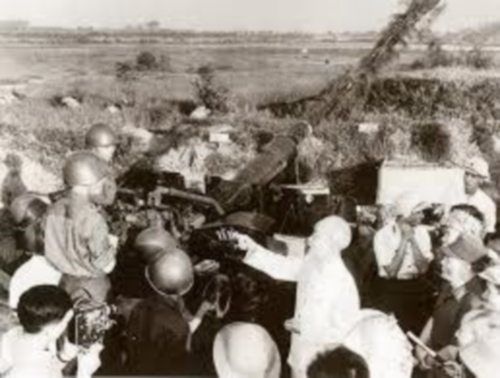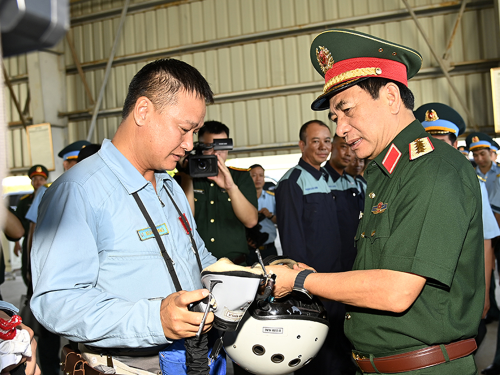The principle of “Man comes before gun” is a distinctive and enduring element of Ho Chi Minh’s military thought. It remains profoundly relevant today and merits continued study and creative application in the development of the People’s Army and a strong all-people national defence to meet the contemporary demands of safeguarding the Fatherland.
According to President Ho Chi Minh, in the relationship between human beings and weaponry, it is always the human factor that holds decisive importance. Humans are not only the creators, manufacturers, and maintainers of weapons but also the ones who wield and maximise their utility. He emphasised: “Weapons alone cannot determine victory. One must assess whether the wielder of the weapon is a resolute combatant.” No matter how advanced or modern the weaponry may be, it is rendered useless if the user lacks proficiency, technical skills, fighting spirit, or a sense of responsibility. Therefore, human resources must be educated, trained, organised, and forged into a unified and cohesive force to fully leverage the capabilities and functions of weapons in combat.
 |
| President Ho Chi Minh comes to visit air defence troops protecting Hanoi on 25 September 1966 ( A file photo) |
While accentuating the role of the human factor, President Ho Chi Minh also affirmed the indispensable role of weaponry in revolutionary warfare: “To rise in insurrection, weapons are essential. This is a matter of utmost importance in revolution.” For weaponry to be transformed into great material power and to unleash its full potential in warfare, he consistently encouraged military personnel and the populace to embrace self-reliance, ingenuity, and initiative, optimising the use of available tools and combining rudimentary weapons with modern ones in the struggle against the enemy.
Deeply imbued with Ho Chi Minh’s ideology of “Man comes before gun”, our Party has always attached importance to effectively balancing the human-weapon relationship and applying this creatively in building the People’s Army and a resilient all-people national defence. From an initial force of just 34 soldiers wielding primitive arms such as sharpened bamboo sticks and spears, the Vietnam People’s Army has grown into a formidable force that, alongside the people, has achieved glorious victories over colonial and imperial invaders to secure independence and national unity. In the current era of nation-building and national defence, the Party’s thinking on the development of the People’s Army and national defence has significantly evolved, now guided by the fundamental tenet of maximising the power of great national unity and integrating the human factor with weapons and technical equipment. Resolution No.24-NQ/TW dated 16 April 2018 of the Politburo (12th Tenure) on the “Vietnam National Defence Strategy” explicitly affirms the unwavering principle of “Man comes before gun”, placing humans at the heart of national defence. It stresses the development of high-quality human resources with strong moral character, practical competence, and professional expertise in national defence and protection. The strategy aims to harness the collective strength of the entire political system and the populace to firmly safeguard peace and territorial integrity without recourse to war; to enhance national defence and security capacities; and to construct a robust “people’s defence posture”, affirming that national defence is “of the people, by the people, for the people”. In particular, Resolution No.44-NQ/TW dated 24 November 2023 of the Central Committee of the Communist Party (the 13th Tenure) on the “Strategy for National Protection in the New Situation” underscores the pivotal role of the populace in national defence. It advocates for effective implementation of the people’s national defence doctrine and people’s war strategy; construction of a resilient “people’s defence posture”; and mobilisation of the populace by invoking national pride, self-reliance, patriotic traditions, and the unity of the entire nation. It asserts that societal stability is the decisive factor in all national victories. This constitutes both an inheritance and creative application of Ho Chi Minh’s ideology of “Man comes before gun” and is foundational to strengthening national defence, especially the “people-heart-and-mind posture” and ensuring an enduring peace conducive to national development.
In the face of rapidly evolving and complex global and regional political-security dynamics, hostile forces - both at home and abroad - have been exploiting sensitive issues to sabotage the Party, the State, and the Army through sophisticated and insidious tactics. To fulfil the sacred mission of Fatherland protection, the Party has determined that building a strong all-people national defence capable of comprehensive, balanced, and synchronised strength is essential to prevent and repel all risks of war and be ready to win when war breaks out. This is a completely correct and scientific policy, both urgent and fundamental, long-term, in line with the military guidelines, art, traditions and conditions of our country. It must be pursued through integrated and effective measures, most notably the continued, creative application of Ho Chi Minh’s ideology of “Man comes before gun” in the following key areas:
Firstly, enhance awareness of the pivotal role of the human factor in building the People’s Army and the all-people national defence. In thoroughly grasping President Ho Chi Minh’s ideology of “Man comes before the gun,” Party committees, political organisations, and all levels of the political system must intensify educational and communicative efforts to elevate public and institutional understanding of the primacy of human factor in relation to weaponry, as well as the strategic necessity of weaponry in military and defence operations. It is particularly essential to clarify the immense role of the populace and the formidable strength derived from the great national unity bloc; to affirm the soundness and innovativeness of the Party’s strategy in developing a comprehensive national defence and waging people’s war; and to promote the Party’s modern strategic mindset concerning early and proactive national defence. On this basis, there must be a continued reaffirmation that national defence and the protection of the Fatherland constitute the responsibility and strength of the entire population, with the armed forces serving as the core. Attention should also be devoted to patriotic education - instilling national pride and dignity, and reinforcing citizens’ rights, responsibilities, and obligations in the cause of national construction and defence. Simultaneously, it is imperative to proactively counter distorted perceptions and malicious rhetoric propagated by hostile and reactionary forces, particularly narratives based on “technological determinism.” Through such efforts, it is possible to elevate collective awareness and individual responsibility in thoroughly applying Ho Chi Minh’s ideology of “Man comes before gun” to the construction of a powerful People’s Army and a resilient all-people national defence.
 |
| General Phan Van Giang checks Regiment 927 of the Air Defence and Air Force |
Second, build a strong Vietnam People’s Army, firmly positioning it as the core force in the cause of national defence and the protection of the Fatherland. This is a regular and vital duty of the entire Party, the entire population, the armed forces, and the entire political system - within which the Army holds a central role. Accordingly, it is imperative to thoroughly comprehend and strictly implement the Party’s strategic directives and resolutions, focusing efforts on constructing a revolutionary, regular, elite, and gradually modernised People’s Army, thereby laying a solid foundation for the goal of developing a fully modernised military by 2030. To achieve this effectively, leaders and commanders at all levels must be deeply imbued with Ho Chi Minh’s ideology concerning the primacy of the human factor. Priority must be given to building military units that are politically, ideologically, organisationally, and ethically strong, thereby contributing to the generation of comprehensive strength required to fulfil all assigned missions. Special emphasis must be placed on educating and training officers and soldiers to possess firm political will, unwavering loyalty to the Nation, the Party, the State, and the People; to be prepared to fight and make sacrifices for national independence and freedom, and for the well-being of the people. They must exhibit high moral standards, outstanding professional competence, strict discipline, and a strong sense of determination. Moreover, they must dare to think, to speak, to act, to take responsibility, to innovate, to confront challenges, and to act resolutely for the common good. Training activities must be organised in a comprehensive yet focused and priority-driven manner, closely aligned with practical requirements. This will serve to improve overall quality, enhance combat strength, and ensure the successful accomplishment of all designated missions.
Thirdly, prioritise the construction of a resilient “people-heart-and-mind posture” as a fundamental and driving force for developing a strong all-people national defence. In thoroughly internalising Ho Chi Minh’s ideology of “Man comes before the gun,” it is imperative to focus on nurturing the strength of the people and fully harnessing their vital role in the cause of national defence and the safeguarding of the Fatherland. This entails sustaining vigorous efforts to promote economic, cultural, and social development; eradicating hunger; alleviating poverty; and continuously improving the material and spiritual living conditions of the people, especially in remote, border, island, and socio-economically disadvantaged areas. Proactive measures must be taken to narrow the gap between rich and poor, between different regions and communities, while ensuring progress, equity, and comprehensive social welfare, thereby enabling every citizen to enjoy a prosperous and happy life, ensuring that “no one is left behind.” Moreover, it is essential to respect and promote the people’s right to democratic participation; to attend to their legitimate interests and aspirations; and to decisively resolve grievances and issues that provoke social discontent, thus fostering widespread consensus within society. These are practical and meaningful actions that solidify the “people’s defence posture,” strengthen the unity of the great national bloc, and inspire nationwide engagement in the construction of a robust all-people national defence.
Finally, accelerate the development of the defence industry along the lines of proactivity, self-reliance, dual-use capability, and modernisation. Alongside the development of the human factor, it is essential to ensure the adequate provision of weapons and technical equipment for the armed forces. The continued implementation of Resolution No.08-NQ/TW, dated 26 January 2022, issued by the Politburo (the 13th Tenure) on “Promoting the Development of the Defence Industry until 2030 and Beyond,” must be pursued with unwavering commitment. This effort must align with the guiding principles of autonomy, self-sufficiency, dual-purpose utility, and technological modernity - positioning the defence industry as a spearhead of the national industrial sector. This strategic trajectory is designed to ensure a reliable supply of arms and equipment for the People’s Army while enhancing the country’s overall defence potential and capacity. Priority must be given to the research and production of strategically significant weapon systems with credible deterrent capabilities, serving as the nucleus for expanding national comprehensive strength and meeting the most urgent military-defence needs across strategic directions. This also includes the modernisation of key military services, branches, and core forces. Concurrently, it is vital to intensify international cooperation and diversify resource mobilisation in the development of the defence industry. Active participation in the global and regional arms and military technology markets should be promoted to support the overarching objective of building a modernised Army.
Ho Chi Minh’s ideology of “Man comes before gun” continues to retain its profound theoretical and practical value. It must be further internalised and creatively applied in the ongoing construction of a powerful People’s Army and a resilient all-people national defence. This, in turn, will significantly strengthen national power, prevent and repel the risk of war and conflict, and ensure the steadfast protection of the Fatherland from an early stage and at a strategic distance.
Senior Colonel, Dr BUI DINH TIEP, Political Academy, Ministry of National Defence
